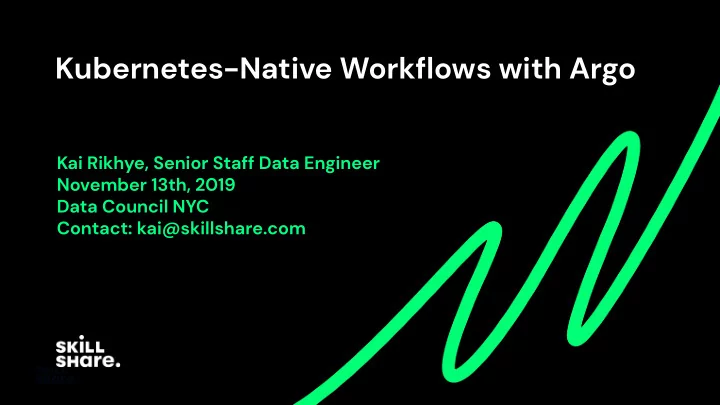

Kubernetes-Native Workflows with Argo Kai Rikhye, Senior Staff Data Engineer November 13th, 2019 Data Council NYC Contact: kai@skillshare.com
Agenda Context & Problem Tool Selection Argo: Details and Experiences
Context & Problem
Context Small team (3 data scientists, 1 data engineer) within a larger online learning startup. Smallish data (XX TBs) but a few use cases: Data analytics: Extracting & transforming user analytics, ● dashboards, re/running analyses on behavior, experiments ML: Have a recommender, want more models ● Integrations : Moving analytics to biz tools (Blueshift, Zendesk) ●
Problem At start of project, we had some standalone pieces + lots of scripts being run on laptops and That One Server. What we needed… ● A place to run ETL/ML/integration tasks ● A tool to orchestrate those tasks into workflows
Example Workflow Transform for Train Extract Users features Recommender Update Extract Video Load to Data Transform for Experiment Analytics Warehouse analytics Analysis Extract Push to email Payments marketing tool
Tool Selection
How Not To Do Tool Selection
First Guiding Principle: Operability Can less than one or more than one person operate it? ● Low conceptual complexity ● Sane development and deployment of workflows ● Logs, metrics, secrets management
Guiding Principle Two: Reliability Does workflows run how they’re supposed to run? ● Explicit dependencies between steps ● Decouple execution logic and orchestration logic ● Can scale as volume of data increases 10x (more customers x more instrumentation x more users)
Things We Don’t Care About (Right Now) ● Graphical creation of DAGs ● Programmatically generated DAGs ● Permissioning & security
What We Definitely Don’t Want
Build or buy? Looked at vendor tools for ETL/ML/integrations, but… No single vendor did everything we wanted, and orchestrating ● one or more vendors + internal tools is hard to do reliably. Also development and deployment can be tricky ● We felt comfortable using open source or writing code for all ● of our workflow tasks. (Some was already written.)
Containers and Kubernetes We built containers for a small set of initial tasks, but needed a place to run them. SRE team is already using K8s for our application platform and offered to provision and help maintain a cluster. Lots of benefits: scaling, secrets management, dev/QA/prod parity, integration with Datadog.
K8s Orchestration: Airflow? Could use Airflow with KubernetesExecutor, but we weren’t enthusiastic for a few reasons: ● Airflow is complex and full of footguns ● We’re not going to be using most of the features ● We found a simpler alternative...
Argo
Argo: Kubernetes-Native Workflows Open source Kubernetes workflow engine built by Intuit. Active project. 100+ contributors, releases every couple of months. Two components: Argo Workflows and Argo Events
What Does Kubernatives-Native Mean? Workflows and Events are defined as Custom-Resource Definitions. Workflows can interface with other K8s resources: Secrets, ConfigMaps, Volume Mounts. Workflows take full advantage of K8s: scheduling affinity, tolerations, resource limits.
Anatomy of a Workflow Defined in YAML (like everything kind: Workflow spec: else in K8s) templates: - name: extractor “Templates” = workflow steps, image: extractor:v3 - name: transformer Just container images image: transformer:v1 dag: Declarative DAG. Just tell it tasks: - name: get-views dependencies and it does the template: extractor rest. parameters: [{table: views}] - name: get-payments template: extractor parameters: [{table: payments}] - name: transform template: transformer dependencies: [get-views, get-payments]
Running a worfklow > argo submit --watch my-worfklow Name: my-worfklow-57r9p Status: Done Started: Sun Nov 10 07:28:38 -0500 (12 minutes ago) Duration: 1 minutes 35 seconds STEP PODNAME DURATION ✔ my-workflow-57r9p ├- ✔ extract-views my-worfklow-57r9p-3933687048 33s ├- ✔ extract-payments my-worfklow-57r9p-1906300422 6s ├- ✔ transform my-worfklow-57r9p-1906300422 1m 2s
Some Advanced Features Parameter Passing container: args: {{tasks.extract.manifest_location}} Artifacts output: input: artifacts: artifacts: - name: results - name: training_results path: /results.csv from: {{tasks.training.results} path: /results.csv
...More Advanced Features... Memoized Resubmit argo resubmit --memoized my-worfklow-57r9p Suspend & Resume (Including in DAG) argo suspend my-worfklow-57r9p task: argo resume my-worfklow-57r9p suspend: {}
...So Many Features ● Sidecars and daemon containers ● All sorts of DAG shenanigans (conditional tasks, sub-DAGs, generated DAGs, loops, recursive DAGs) ● Post-run hooks ● Create K8s resources as a task
Argo UI
Triggering with Argo Events
Packaging & Deployment Because Workflows and Events are K8s resources, we can use helm (package manager) to deploy and upgrade workflows: > helm secrets upgrade --namespace prod -f secrets.prod.yaml . Release "my-workflow" has been upgraded. LAST DEPLOYED: Sun Nov 10 07:55:12 2019 NAMESPACE: prod STATUS: DEPLOYED Makes dev -> QA -> prod deployments very seamless.
Implementation Experience Took about a week to set up Argo. (Caveat: not including Kubernetes set up time.) Using DataDog for log aggregation. Have been running two production DAGs with ~20 tasks for the past six months. One production outage (fixed by a restart).
Wishlist & Future Considerations Currently no way to limit DAG concurrency — can be an issue with time-triggered workflows. Argo Events is a little complex (Events, Gateways, Sensors). We toughed it out but you can run workflows through an API if you want.
Any Questions? Also, we’re hiring: two Data Scientists (Analytics, ML) and a Data Engineer kai@skillshare.com
Recommend
More recommend